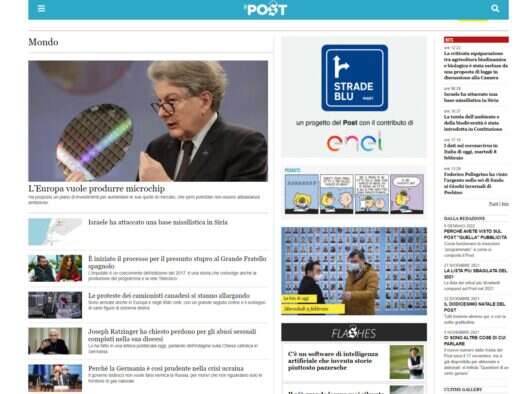
Luca Sofri, the founder of Italy’s Il Post news website, told Press Gazette how, 12 years after launch, it has become one of the most successful member-funded news organisations in the world – without implementing a paywall.
Sofri, 57, founded Il Post in 2010. In the time since, it has gone from losing money to breaking even to losing money again – and, now, to a major expansion.
It has done so without a paywall – relying for survival on its popularity among Italy’s young and, like The Guardian, on “members” willing to pay in to the project for its survival. As of January 2022, the site had more than 50,000 of them.
Il Post set out to be a new kind of Italian news source, and it seems to have succeeded. One Italian journalist Press Gazette spoke with said that Il Post was their favourite news outlet in the country: one they relied on for clear-headed explanations of complex stories.
Press Gazette spoke to Sofri about how Il Post built a working business model by pitching to the historically cash-poor young, and how the site was uniquely well designed to thrive in the pandemic.
‘Every evolution in Italy has been slower than in the other countries to which we’re compared’
Although Italy is usually grouped among western countries, Sofri said its journalistic history has been very different from its peers’.
Newspapers like The New York Times, Germany’s Die Zeit, and France’s Le Monde, Sofri said, “make mistakes, but they [still] have their principles and their ethics.”
“You don’t have something like that in Italy. The big traditional newspapers in Italy – Corriere della Sera, Repubblica, La Stampa – there’s been a completely different history…
“We never had two separate categories of tabloid newspapers and serious newspapers. All the newspapers integrated both the approaches. That meant that Italian newspapers never had the worst of UK newspapers… You don’t get them closed because of scandals.
“But at the same time, the serious news part of Italian newspapers is very contaminated by [the] language, approaches, methods of getting people’s attention that you find in tabloid newspapers.”
‘Spiegato bene’
In 2010, Sofri and an online community of like-minded peers were regarding the Italian media landscape with concern.
Sofri had been a columnist for Italian daily newspapers and magazines, and had hosted or been a commentator for television and radio shows. He was an early adopter of digital technologies, having set up his popular blog Wittgenstein in the year 2000.
His name also carried a certain notoriety. Sofri is the son of Adriano Sofri, the former leader of Italy’s far-left Lotta Continua group who was imprisoned for the murder, during the country’s “Years of Lead”, of policeman Luigi Calabresi. (Adriano maintains he was wrongly imprisoned.)
Sofri and his community of critics felt there was an obvious gap in the news market.
“What we did at the time was not, from our point of view, so innovative – it was just something that you couldn’t find in Italy… invest in accuracy, in trustworthiness, in clarity in explaining things”.

A screenshot of Il Post’s World (“Mondo”) section on Wednesday 9 February, 2022. Stories include one on Europe’s hopes to produce microchips, another on an attack by Israel on a Syrian missile base, and a third on “Why Germany is so cautious in the Ukraine crisis”.
This approach birthed the site’s slogan: “Spiegato bene”, or “Well explained”. A typical explainer article on Il Post might be titled, for example, “Sharia, well explained” or “How to use a face mask, explained”.
Seemingly by coincidence, the young publication ended up building a young readership, too.
“It wasn’t our aim to get to young readers. Our aim was to explain things better. But what happened was that you explain things better, and you put things in context, and you tell stories [about what] happened in the past century and so on – the young readers are the ones most interested. They find there what they don’t find somewhere else.”
The project originally received financing of approximately 1m euros from a group of five people including Sofri, centre-left Bergamo mayor Giorgio Gori, and Andrea Guerra, former chairman of the food chain Eataly.
Sofri jokes that he has the opposite problem with proprietors from most editors-in-chief.
“I never hear from them.
“Sometimes I protest that they don’t call – they never call, not to tell me what to do, but not [even] to ask me what’s happening.”
‘What we had been doing for 10 years became a life and death thing’
The publication reached break-even after six years, based largely on advertising revenue. But when the advertising model started to crumble in 2016, Il Post went back into the red for a further three years.
That changed, Sofri said, when two things happened.
“The first is that we launched a membership programme… Rather unique, but not completely unique, because it’s one we share with The Guardian. So you don’t have any paywalls on Il Post.”
The membership programme went live in May 2019, achieving 2,000 subscribers in the first week and 3,000 in the first month. It costs €8 a month, or €80 euros for a year; Sofri said the majority of subscriptions are year-long.
There are certain premium perks that Il Post subscribers get access to, most themed around the idea of a small, communicating community.
Paying members get an ad-free site, exclusive podcasts and newsletters, and the ability to comment on stories. In May, Post deputy editor Francesco Costa launched “Morning”, a daily press review podcast, which Sofri says garnered more than 80,000 listeners in the first month. After 100 episodes it became a member perk: Sofri says listener numbers accordingly diminished, but the podcast was a major driver of subscriptions.
“The things that worked most were our community and the trust we built in time… We had a lot of readers that had been telling us for a long time that they wanted to help, and that they wanted to finance Il Post.”
The second thing was the pandemic.
“All the newspapers were saying one thing today, and the day after another thing. So what we had been doing for 10 years, literally, became a life and death thing.
“A lot of new people were interested, and there was a lot of sharing of our things, our explanations, our way of telling people: things are complex.
“A lot of new readers came, a lot of new subscribers came. We started a daily newsletter on the pandemic very early… Italy was the first western country to go through great difficulties in the first weeks of the pandemic. I think that we were the first to make a daily newsletter about coronavirus. And it got 70,000 subscribers in a week.”
At the end of 2021, Il Post was receiving an average of 15m readers a month. The publication generated 400,000 euros in profit across 2020.
“Now we have 30 people in our newsroom. We made investments that we couldn’t do before. We do more original reporting. We have spent 10 years essentially working on aggregation and curation and explaining things, but we almost never had people on the field or on the street or doing original reporting.”
“We closed 2021 with three times the [number of] people that were subscribed at the beginning of the year.”

Il Post’s offices in Milan. (Picture: Luca Sofri)
Monetising an unmoneyed audience
The young aren’t famed for their deep pockets. Were Il Post’s youth readership well represented among their paying members?
“No… this is a contradiction. We have this promising business model, and we have the wrong readers for this promising business model.”
But he said there are positive feedback loops from having many younger readers: young people tell their parents and grandparents about Il Post, and those parents and grandparents buy their kids Il Post memberships.
“So it works in very not direct ways, but it still works.”
But anyway, higher revenue is a means to an end, Sofri says.
“I have to tell you – it’s something I’m embarrassed with… but we’re trying to make things better with information.
“Getting money for membership is a way of reaching the aim that’s getting a lot of people to read us. That’s why we don’t have a paywall. We don’t want a paywall.”
Happily, the site appears to be managing both the main aim and the auxiliary one. In February 2020, reader subscriptions accounted for 40% of revenue; by January 2022, that figure had climbed to somewhere closer 60%.
‘The problem is in the culture’
In Sofri’s view, since the acquisition of Italy’s La Stampa and La Repubblica newspapers by the Agnelli industrial dynasty in 2019, the country no longer has a truly left-wing leading paper.
Press Gazette asked whether, in light of that comment, Sofri viewed Il Post as a progressive project, or as one striving for impartiality.
“Both.”
What did Sofri feel made Il Post’s membership model successful?
“For a long time, it’s been people who wanted to trust in the project.
“We have a daily newsletter for subscribers that has a very different tone from Il Post. Il Post stories are, as I told you, very neat, very anonymous, very ‘stick to the facts’, ‘tell the story’, and so on.”
In contrast, Sofri said that the members-only daily newsletter has “a completely different tone. We have the tone you have in a pub with your friends.”
Press Gazette asked Sofri whether, since Il Post tried so consciously to be more transparent and impartial than its competitors, it was igniting by example a debate around media standards in the country.
In explaining his answer, Sofri enquired whether in English, as in Italian, there was the cliché of people defending themselves against charges of homophobia by protesting: “I have a lot of friends who are gay!”
Told that there is, he replied that at Il Post, “We sometimes say: ‘We have a lot of friends in traditional newspapers!’”
Despite the joke, Sofri said he thought a national discussion over standards would likely be happening regardless – and that Il Post really did have a lot of friends at traditional media.
“We don’t think that the problem is with people and individual traditional journalists. The problem is in the culture… and in the absence of traditional principles of journalism in Italian newsrooms…
“Yes, it happens a lot with our readers that they compare things. Sometimes it’s embarrassing because our colleagues and friends in other newspapers get angry with us because people [on social networks] are telling them ‘Do what Il Post do!’
“I would not say – because it wouldn’t be true – that sometimes we are not pointing fingers at the way they do things.” But Sofri said that they try to point fingers at the practices, rather than at individual journalists.”
On the topic of social media: no news site, no matter how transparent and impartial it aims to be, can become prominent without gaining detractors. Who were Il Post’s?
“We try to use irony and use humour, and not exaggerate things [or be] too serious about things and so on. But it’s obviously an approach that makes some people – not all – but some people, yes, get angry. But – who do you think you are?”
‘Think of your readers as people like you’
Did Sofri feel there were any lessons English language media could learn from Il Post’s experience?
“One colleague of ours, in a big newspaper, Corriere della Sera, told us that what they’re most envious of is our relationship with readers…
“Work a lot on the relationship with your readers, and on making your readers understand that they’re important and they’re collaborating with what you’re doing.
“Think of your readers as people like you. They are not, obviously, and you have to get used to understanding that a lot of people are very different. But sometimes with Italian media, you have the impression that the journalists are writing… for someone who doesn’t understand the themes very well. They wouldn’t say the same thing if they were with their friends.”
Il futuro, spiegato brevemente
What did Sofri foresee in Il Post’s future?
“Now we have the resources to do things that we couldn’t do before.
“We’ve always been doing what we were sure was paying for itself. We couldn’t do experiments… Now we can. And sometimes they work, sometimes they don’t work”.
One such experiment has been the publication of “Cose spiegate bene” (“Well explained things”), a print product that’s somewhere between a magazine and a book. The two editions published in 2021 used their length – each over 200 pages – to explore a specific theme. The first was about books; the second, gender.
“It helped us reach a lot of new people because it’s in bookshops and it’s something different from what we do”.
Now, Sofri says, “we have a community of readers and subscribers that are precious capital to invest in our plans, because we know that when we do things… Before we go to bookshops with [the magazine], in the first two weeks, we sell it online to our subscribers, and 3,000 people buy it. So for the day we go to the bookshops, we have already been repaid. And this happens when we do public events.
“It’s not just money coming from this community.”
Pictures: Luca Sofri, Press Gazette screenshot
Email pged@pressgazette.co.uk to point out mistakes, provide story tips or send in a letter for publication on our "Letters Page" blog
